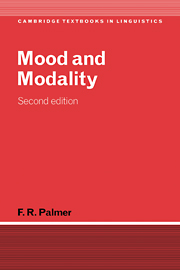Book contents
- Frontmatter
- Contents
- Preface
- Note on the text
- List of abbreviations
- 1 Introduction
- 2 Modal systems: Propositional modality
- 3 Modal systems: Event modality
- 4 Modal systems and modal verbs
- 5 Indicative and subjunctive
- 6 Realis and Irrealis
- 7 Subjunctive and irrealis
- 8 Past tense as modal
- References
- Language index
- General index
1 - Introduction
Published online by Cambridge University Press: 05 June 2012
- Frontmatter
- Contents
- Preface
- Note on the text
- List of abbreviations
- 1 Introduction
- 2 Modal systems: Propositional modality
- 3 Modal systems: Event modality
- 4 Modal systems and modal verbs
- 5 Indicative and subjunctive
- 6 Realis and Irrealis
- 7 Subjunctive and irrealis
- 8 Past tense as modal
- References
- Language index
- General index
Summary
It has come to be recognized in recent years that modality is a valid cross-language grammatical category that can be the subject of a typological study. It is a category that is closely associated with tense and aspect in that all three categories are categories of the clause and are generally, but not always, marked within the verbal complex.
In notional terms all three are, in some way, concerned with the event or situation that is reported by the utterance (though for simplicity the term ‘event’ will, throughout this volume, be used to cover events, actions, situations, states, etc.). Tense, rather obviously, is concerned with the time of the event, while aspect is concerned with the nature of the event, particularly in terms of its ‘internal temporal constituency’ (Comrie 1976: 3). Modality is concerned with the status of the proposition that describes the event.
Basic concepts
Realis and irrealis
Modality differs from tense and aspect in that it does not refer directly to any characteristic of the event, but simply to the status of the proposition. One possible approach to its analysis is to make a binary distinction between ‘non-modal’ and ‘modal’ or ‘declarative’ and ‘non-declarative’, and to associate this distinction with the notional contrast of ‘factual’ and ‘non-factual’, or ‘real’ and ‘unreal’.
However, these terms are not really satisfactory (see 1.1.2), and in recent years ‘realis’ and ‘irrealis’ have been used for this distinction.
- Type
- Chapter
- Information
- Mood and Modality , pp. 1 - 23Publisher: Cambridge University PressPrint publication year: 2001



